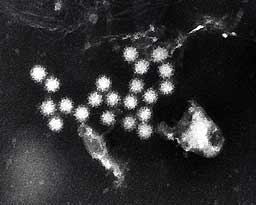Note: The information and opinions stated in this article are solely those of the author and are unrelated to pyroenergen.com.
Norwalk Virus and its Outbreaks in Japan
Other common name(s): norovirus, tummy flu, calicivirus
Family name(s): Caliciviridae
Description
 Norwalk virus is an extremely common cause of food-borne illnesses especially in Japan. It greatly affects the human gastrointestinal system. The viruses are commonly associated with shellfishes harvested from sewage-contaminated waters. The norovirus occurs sporadically on many places of the world mainly cruise ships, schools, daycares, restaurants, and summer camps.
Norwalk virus is an extremely common cause of food-borne illnesses especially in Japan. It greatly affects the human gastrointestinal system. The viruses are commonly associated with shellfishes harvested from sewage-contaminated waters. The norovirus occurs sporadically on many places of the world mainly cruise ships, schools, daycares, restaurants, and summer camps.
What Are the Symptoms of Norovirus Infection?
Norwalk virus symptoms occur in all age groups and may include the following:
- Stomach cramping
- Nausea
- Vomiting (profuse, nonbloody, nonbilious)
- Watery diarrhea
- Low-grade fever
- Head or muscle aches
The symptoms usually show within 1 to 3 days after exposure to the virus, and can persist up to two days to several weeks.
How Do Noroviruses Spread?
Norwalk viruses are transmitted via the fecal-oral route. These viruses only spread from person-to-person, and can't be spread by animals.
Other common routes of infection include:
- Shellfishes harvested from waters contaminated with sewage.
- Having contact with objects or surfaces contaminated with norovirus, and then placing their hand in their mouth.
- Infected people who don't wash their hands properly after using the bathroom, and then prepare food or touch food that another person might eat.
- Water or ice that is contaminated with sewage.
Recurrent infections can occur through lifetime because norovirus has many different strains, which makes a person's body difficult to develop long-term immunity.
How Norwalk Virus is Diagnosed?
Until recently, several tests have became available that can detect norovirus. Laboratory techniques like ELISA (Enzyme-Linked ImmunoSorbent Assay) method and the RT-PCR (reverse transcription polymerase chain reaction) method are used for diagnosis.
Outbreaks in Japan
In 2006 widespread outbreak of Norwalk virus occurred in Japan. The expected number of infected people exceeds 10,000,000 in the end of 2006. It is the worst outbreak of contagious gastrointestinal disease that hit Japan in a quarter century. Many people have already died of it.
Japanese citizens especially foreigners traveling to Japan are taking precautionary measures by not eating raw seafoods to avoid possible infection. This has caused oyster farmers in the Hiroshima Prefecture (largest oyster shipper in Japan) and Miyagi Prefecture (second largest oyster shipper in Japan) to halt shipping their products, thus, oyster shipping volume and market price all over the country has decreased.
How to Prevent the Spread of Norwalk Virus
The best way to prevent the spread of Norwalk viruses is by thorough handwashing after toilet use and before preparing or serving foods for at least 15 seconds. In addition, have plenty of rest and stay home until your Norwalk virus symptoms are gone. Other preventive measures are:
- People who already have a Norwalk virus infection should never prepare food for others.
- Those who are sick with diarrhea or vomiting should not work in daycare centers or health care facilities until these symptoms have stopped.
- Dispose or clean and disinfect infected materials or contaminated surfaces immediately after an incident of Norwalk virus infection in your home.
- Eat only thoroughly cooked shellfish. Avoid food or water that might be prepared in an unsanitary way such as party foods, raw or uncooked foods, and shellfishes.
- Immediately wash clothing that may be contaminated with Norwalk virus after an illness incident.
- Avoid handshaking when it's not necessary.
Getting a Norwalk-type virus or norovirus can ruin your vacation, but the fear of getting this virus should not keep you at home. Use proper sanitation procedures and remember that you are just as likely to get sick in your hometown!
Treatment for Norwalk Virus Infection
There is no antibiotic (Norwalk virus is not bacterial) and antiviral agents that can kill or treat Norwalk viruses. There is also no vaccine yet to prevent infection. Never use any antibiotics, as they tend to make the illness worse. Getting rest and drinking plenty of water to avoid dehydration is the most recommended for this type of illness. Dehydration has the most detrimental effect that can result from norovirus infection. Doctors suggest drinking juices that gives additional nutrients to the body rather than drinking just plain water. Avoid drinking milk as it contains sugars that are hard to break down making it harder to digest. Milk may bring you additional gastrointestinal problems like stomach cramps and diarrhea.
Some doctors suggest the following recipe for an oral rehydration drink that you can buy at most convenience stores and it is inexpensive to prepare:
To one liter of water, add
- 8 teaspoons of table sugar
- 1/2 teaspoon of table salt
- 1/3 teaspoon of Lite salt (potassium chloride) and
- 1/2 teaspoon of baking soda
Contracting Norwalk-type viruses or noroviruses can indeed be very dangerous and deadly when the preventive measures are not followed. Remember to use proper sanitation procedures and utmost cares as soon as an illness episode occurs. Still, the best-known treatment in the medical community is to drink plenty of liquid or electrolyte replacement.
References
Wisconsin Department of Health and Family Services:
http://dhfs.wisconsin.gov/communicable/factsheets/norovirus.htm
HealthLink Medical College of Wisconsin:
http://healthlink.mcw.edu/article/1031002212.html
Todd Wills, MD, Assistant Professor, Department of Internal Medicine, Division of Infectious Diseases, University of South Florida College of Medicine:
http://www.emedicine.com/med/topic1648.htm
Yomiuri Online Japan:
http://www.yomiuri.co.jp/e-japan/hokkaido/kikaku/019/12.htm




